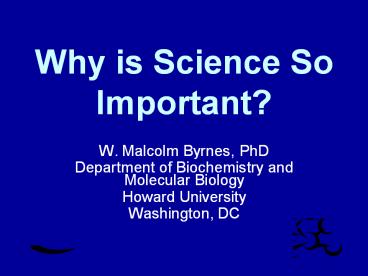Why is Science So Important? - PowerPoint PPT Presentation
1 / 21
Title:
Why is Science So Important?
Description:
Why is Science So Important? W. Malcolm Byrnes, PhD Department of Biochemistry and Molecular Biology Howard University Washington, DC Omayra Ortega Mathematical ... – PowerPoint PPT presentation
Number of Views:2344
Avg rating:3.0/5.0
Title: Why is Science So Important?
1
Why is Science So Important?
- W. Malcolm Byrnes, PhD
- Department of Biochemistry and Molecular Biology
- Howard University
- Washington, DC
2
What I Plan to Talk About
- Something About Me
- STEM is Central
- Ernest Everett Just
- Four Role Models in STEM Today
- Emerging Areas in Science
- What Does It Take to Succeed?
- Questions for Discussion
3
So Who is this guy?
- Grew up in rural Louisiana town (Ethel)
- Attended rural High School (Clinton HS)
- College Xavier University of Louisiana
- Taught high school
- Graduate School LSU in Baton Rouge
- Did research at Cornell University in Ithaca, NY
- Now Associate Professor at Howard University
- Study how enzymes work
Howard University
4
And Why is Science Important?
- We live in a technological age.
- Our problems require technological and scientific
solutions. - Global climate change
- Antibiotic resistance
- Infectious disease
- Society needs to be scientifically informed in
order to make good decisions
5
toxicology
medicine
ecology
STEM
politics (?!)
drug-making
astronomy
climate science
6
But science also allows us to be creative and
satisfy our curiosity about the natural world.
It helps us findour placein the universe.
7
Ernest Everett Just
- Curious
- Creative
- Passionate
- Persistentovercame great obstacles
- Was rejected
- But ultimately was successful
- Now theres agreement that he was right about a
lot of things.
8
(No Transcript)
9
EE JustEarly Days
- Born in Charleston, SC, in 1883
- Grew up on James Island
- As a child, educated mostly by his mother
- Attended
- SC State College,
- Kimball Union Academy and
- Dartmouth College (1907)
10
Howard University and Woods Hole
Howard University
- Taught at Howard University (1907)
- English? Biology? Zoology Departments
- Did research at the Marine Biological Laboratory
(MBL) at Woods Hole, MA - PhD in embryology at University of Chicago (1916)
- Studied fertilization in marine invertebrates
Woods Hole, MA
11
Fertilization
- Union of sperm and egg to produce a new organism
- Steps
- Sperm attracted by egg
- Sperm and egg cell membranes fuse
- Sperm nucleus released into egg cytoplasm
- Fast and slow blocks to polyspermy occur
- fertilization membrane forms
- Nuclei fuse
Available at http//www.sidwell.edu/us/science/vl
b5/Labs/Urchin_Lab/
12
Marine Invertebrates Whose Eggs E. E. Just Studied
A B C
- ASand Dollar
- BMarine Worm (Platynereis dumerilii)
- CParchment Worm DMarine Worm (Nereis limbata)
- ESea Urchin
D E
13
Later Years
- Spent a lot of time doing research in Europe
- Naples, Italy
- Berlin, Germany
- Roscoff, France
- Moved there permanently in 1938 (Roscoff)
- Had to leave when Nazis invaded France
- Died in 1941
14
Lessons from E. E. Just
- Follow your passion
- Never give up
- Prepare for success
- Work hard
- Believe in yourself
- Dont be afraid to challenge authority
15
Four Role ModelsWarren Washington
- Climate modeler
- Grew up in Portland, OR
- College degree in physics PhD in metrology
- 2nd African American to earn doctorate in the
atmospheric sciences - Shared Nobel Peace Prize in 2007
- Awarded National Medal of Science by President
Obama in 2010
16
James Hildreth
- Expert in HIV-AIDS
- Discovered that cholesterol plays role in entry
of the AIDS virus into cells - College degreeHarvard PhDOxford (immunology)
medical degreeJohns Hopkins - Formerly at Meharry Medical College in Nashville
now at UC-Davis
17
Omayra Ortega
- Mathematical epidemiologist
- From Queens, NYC parents from Panama
- College degreePomona College PhDUniversity of
Iowa - Now Assistant Professor at Arizona State
University - Her advice
- Practice a lot
- Stick with it and keep trying
- Look for mentors and a supportive community
- Take advantage of supportive programs (REU, EDGE)
18
Tyrone Hayes
- Herpetologist (studies frogs)
- Grew up in South Carolina
- Loved to track down snakes, turtles and toads
- CollegeHarvard PhDUC-Berkeley
- Now professor of integrative biology at
UC-Berkeley - Discovered that pesticides (atrazine) can cause
feminization of frogs at low doses - Recent disdovery atrazine can act as
environmental trigger for breast cancer
19
Three Important New Areas in Science and Medicine
- Alternative Energy
- biofuels
- Personalized Medicine
- Sequencing human genomes to predict disease risk
- Genetics versus societal factors
- Bioethical issues
- Health Disparities Research How can we make sure
everyone gets equal health care? - HIV-AIDS
- Prostate cancer
- Breast cancer
20
What You Need to Succeed in STEM
- Passion and persistence
- Take as many classes as you can in science and
mathematics - Never believe anyone who says You cant do
that. - Use each experience as a stepping stone to the
next - Seek help along the way
- Draw strength from role models
21
Questions for Discussion answer one or more of
these
- Name an experience that made you more interested
in science or mathematics. Describe what
happened. - Name a person who helped you become interested in
science or mathematics. What did he or she do? - What are your plans?































